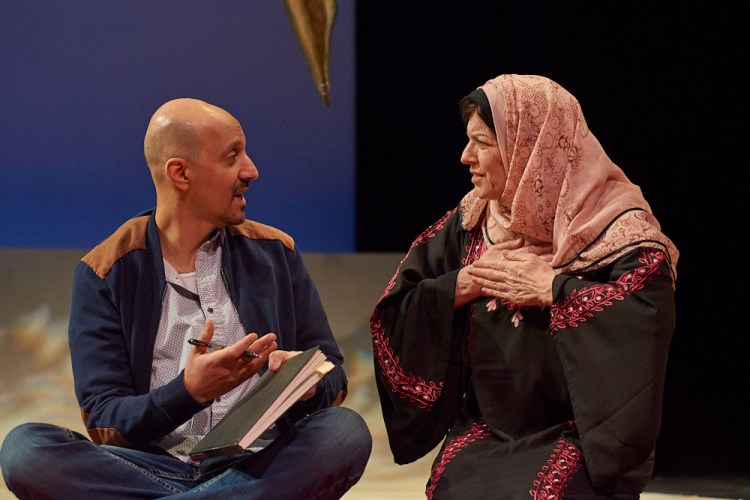“Refuge Malja,” a play by Portland’s own Bess Welden with Arabic translation by Ali Al-Mshakheel at Portland Stage though Nov. 18, ditches a heavy plot in favor of a lyrical dreaminess.
The story centers on war photographer Jamie (Brooke Parks), with a series of important scoops to her name, who also uses her camera almost as an emotional shield. She meets a young Syrian refugee in Greece, as she reports on the crisis from the island of Lesbos – where, in real life, thousands remain stranded and more keep arriving, as they have for some three years – while shooting a series on abandoned shoes.
Despite a language barrier, Jamie befriends motherless, shoeless Whaleed (played on various nights by Portland area students Mohammad Adam, Hussein Al-Mshakheel and Anwer Ali), gives him a junior camera and helps him look for his mother, ultimately bringing him back to her hotel in order to care for him herself.
The production plays with time in a number of ways – not just moving from present to past and back, but also demonstrating what a different sense of time Americans have compared to the souls of the Middle East and elsewhere. Jamie’s ex, reporter-poet Ibrahim (Amro Salama), writes movingly about the 400-year-old olive tree in Palestine where his mother still serves olives and tea. Anita Stewart’s beautifully sparse set, Scott Bolman’s lighting and Mark Van Hare’s sound design move the production in space and time, in dreams and awake, indoors and out and across the world, with the help of massive projected images.
As she contemplates taking on a role that she has, in the past, taken great care to avoid – motherhood – Jamie contends with the grave sickness of her own estranged mother back in the States. In a way, she faces what America itself confronts these days. Unlike so many other countries, with thousands of years of tradition to guide them, their citizens rooted in more or less singular ethnic identities, America has really only one great tradition – opening her heart to shoeless wanderers.
Like America, Jamie is unmoored and unsure, however, and the yellow-eyed wolf that has for years visited her in her imagination offers nothing concrete. The play depends on its flashbacks and lots of expeditionary dialogue to move its story along, but director Kareem Fahmy keeps a gentle pace so that the shifts in time and distance are clear. The opening night audience was captivated by the production’s ethereal nature as Parks and Salama provided the sharp relief of reality by bringing their characters great depth: he, poetic yet practical; she, independent and alone.
In the end, Jamie must choose between fulfilling a family obligation and following through on what she started – an unspoken promise of safety and care she’s made to a boy who has precious few choices. It may be clear to many in the audience what Jamie does, while to others it will remain a mystery. What you think probably all comes down to what you hope for.
Daphne Howland is a freelance writer living in Portland.
Send questions/comments to the editors.



Comments are no longer available on this story